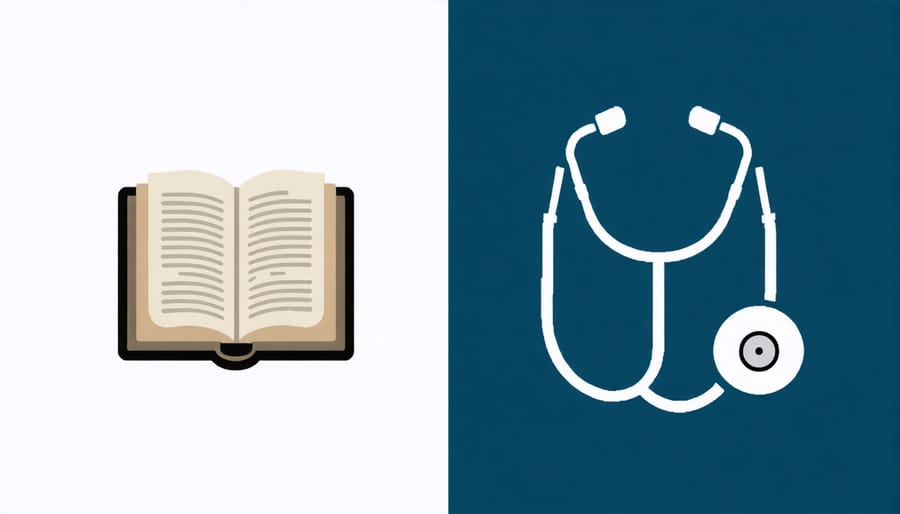Throughout Scripture, healing emerges as a powerful testament to God’s loving nature and redemptive power, bridging the sacred connection between physical wellness and spiritual wholeness. From the miraculous healings of Jesus to the prophetic ministries of the Old Testament, the Bible consistently reveals how body, mind, and spirit wellness intertwine in God’s perfect design for human flourishing.
When Jesus walked the earth, He demonstrated that physical healing often paralleled spiritual restoration, treating each person as a whole being rather than separate components. “Is anyone among you sick? Let them call the elders of the church to pray over them and anoint them with oil in the name of the Lord” (James 5:14) reflects this holistic approach to healing that remains relevant today.
Modern believers find themselves at a unique intersection of faith and medicine, where ancient biblical wisdom complements contemporary healthcare practices. This divine partnership between spiritual and physical healing offers hope and practical guidance for those seeking wholeness in every aspect of their lives, establishing a framework where prayer, faith, and medical wisdom work in harmony toward complete restoration.
The Biblical Foundation of Healing
Old Testament Healing Accounts
The Old Testament contains numerous accounts of miraculous healings that demonstrate God’s power and compassion. These stories not only illustrate physical restoration but also reveal important biblical principles for health and wholeness that remain relevant today.
One of the most notable healing accounts is that of Naaman, the Syrian commander who was cured of leprosy after following the prophet Elisha’s instructions to wash seven times in the Jordan River (2 Kings 5:1-14). This story teaches us about the importance of humility and obedience in the healing process.
King Hezekiah’s healing is another powerful example. When faced with a terminal illness, he turned to God in earnest prayer, and the Lord added fifteen years to his life (2 Kings 20:1-6). His experience highlights the connection between faith, prayer, and divine healing.
The book of Exodus records how God provided healing for the Israelites through the bronze serpent (Numbers 21:4-9), which later became a prophetic symbol of Christ’s healing power. When the people of Israel were bitten by serpents, looking upon the bronze serpent brought physical healing, demonstrating God’s mercy and the power of faith-filled obedience.
These accounts remind us that God’s healing power has been active throughout history, working through various means while always pointing to His sovereignty and love for His people.
Jesus’s Ministry of Healing
Jesus’s healing ministry stands as one of the most profound demonstrations of God’s love and power in the New Testament. Throughout the Gospels, we witness Christ healing people from various ailments – from blindness and leprosy to demon possession and chronic illness. These healings weren’t merely physical acts but carried deep spiritual significance, often accompanied by Jesus’s teachings about faith, forgiveness, and God’s kingdom.
A remarkable aspect of Jesus’s healing ministry was its inclusivity. He healed everyone who came to Him in faith, regardless of their social status, gender, or ethnicity. The story of the woman with the issue of blood (Mark 5:25-34) beautifully illustrates how faith intersects with healing, while the healing of the centurion’s servant (Matthew 8:5-13) shows that Christ’s healing power extends beyond physical presence and cultural boundaries.
Jesus often connected physical healing with spiritual restoration. When healing the paralytic (Mark 2:1-12), He first declared, “Your sins are forgiven,” demonstrating that spiritual wholeness was His primary concern. These healing miracles served as signs pointing to His divine authority and the coming of God’s kingdom.
Christ’s healing ministry also established a model for the church. He commissioned His disciples to heal the sick (Matthew 10:8), showing that healing ministry should continue as part of the church’s mission. This legacy encourages believers today to pray for healing while maintaining faith in God’s sovereign wisdom regarding how and when He chooses to heal.

Spiritual Practices That Support Physical Healing
The Power of Prayer
Prayer stands as one of the most powerful spiritual tools for healing in the Bible, serving as a direct line of communication with God. Throughout Scripture, we find numerous examples of healing prayers, from Moses’s plea for Miriam’s healing from leprosy to the earnest prayers of the early church for their sick members.
James 5:14-15 provides a clear instruction: “Is anyone among you sick? Let them call the elders of the church to pray over them and anoint them with oil in the name of the Lord. And the prayer offered in faith will make the sick person well; the Lord will raise them up.” This passage emphasizes both the communal aspect of prayer and the importance of faith in the healing process.
The power of prayer for healing operates on multiple levels. First, it strengthens our connection with God, allowing us to rest in His presence and trust His wisdom. Second, prayer often brings emotional and psychological comfort, reducing stress and anxiety which can impact physical well-being. Finally, through prayer, we open ourselves to God’s healing power, whether it comes through supernatural intervention or through guidance toward effective medical treatment.
To practice healing prayer effectively:
– Approach God with humility and faith
– Be specific about your needs while remaining open to God’s will
– Combine prayer with praise and thanksgiving
– Maintain consistency in your prayer life
– Join with others in prayer when possible
Remember that while God’s healing may not always come in the way or timing we expect, prayer remains a vital component of both spiritual and physical healing, working alongside medical care to promote wholeness and well-being.
Faith and Divine Healing
Throughout Scripture, faith emerges as a crucial element in divine healing, serving as a bridge between human need and God’s healing power. The Gospel accounts repeatedly showcase Jesus acknowledging and responding to the faith of those seeking healing, as evidenced in Matthew 9:22 when He tells the woman with the issue of blood, “Your faith has made you well.”
This connection between faith and healing isn’t merely historical; it demonstrates the power of resilient faith that continues to work in believers’ lives today. When we approach God with unwavering trust in His healing capabilities, we open ourselves to His restorative work in both body and spirit.
However, it’s important to understand that faith in divine healing isn’t about formulaic prayers or testing God. Rather, it’s about maintaining a steadfast trust in God’s goodness and wisdom, even when healing manifests differently than we expect. James 5:15 tells us, “The prayer of faith will save the sick, and the Lord will raise them up.”
Faith for healing also involves community support and spiritual fellowship. The early church demonstrated this through collective prayer and anointing with oil, practices that many believers continue today. This communal aspect of faith healing reminds us that we’re not meant to face health challenges in isolation.
While we trust in God’s healing power, this faith doesn’t diminish the value of medical care. Instead, it complements it, recognizing that God often works through both supernatural and natural means to bring about healing in our lives.

Community Support and Healing
Throughout Scripture, we see countless examples of how healing flourishes within community. The early Church, as described in Acts 2:42-47, demonstrated this beautifully as believers came together daily, sharing their lives and supporting one another in both spiritual and physical needs. This model of communal care remains vital for healing today.
When we face health challenges, the support of fellow believers can make a profound difference. James 5:14-15 instructs, “Is anyone among you sick? Let them call the elders of the church to pray over them and anoint them with oil in the name of the Lord. And the prayer offered in faith will make the sick person well.” This passage highlights the importance of reaching out to our faith community during times of illness.
The healing power of Christian community works in multiple ways. First, it provides practical support through meals, transportation, or assistance with daily tasks. Second, it offers emotional comfort through presence, understanding, and shared experiences. Most importantly, it creates an environment of collective faith where prayers are multiplied and hope is strengthened.
Consider how Paul speaks of the church as one body in 1 Corinthians 12:26: “If one part suffers, every part suffers with it; if one part is honored, every part rejoices with it.” This reminds us that healing isn’t meant to be a solitary journey. When we bear one another’s burdens, as instructed in Galatians 6:2, we create a nurturing space for God’s healing work.
Active participation in a faith community also provides accountability and encouragement in maintaining healthy spiritual practices that contribute to overall wellness. Regular fellowship, worship, and prayer with others can reduce stress, anxiety, and feelings of isolation – all factors that can impact physical health.
Remember, Jesus often healed people in the presence of others, showing us that community plays a vital role in God’s healing ministry. Whether through organized prayer groups, small group ministries, or informal gatherings of believers, the support of fellow Christians remains a crucial component of both physical and spiritual healing.
Practical Applications for Today

Combining Faith with Medical Care
The Bible demonstrates that physical and spiritual healing can work together harmoniously. When Jesus healed people, He often addressed both their physical ailments and spiritual needs, showing us that these aspects of healing are interconnected. This biblical perspective supports integrating faith with modern treatment approaches.
Scripture encourages us to seek wisdom in all its forms. Proverbs 4:7 reminds us to “get wisdom, and whatever you get, get insight.” This principle applies to healthcare decisions, where we can embrace both medical expertise and spiritual guidance. Just as God blessed Luke, “the beloved physician” (Colossians 4:14), to care for others, He continues to work through medical professionals today.
Consider how James 5:14-15 instructs believers to “call for the elders of the church” while also using the practical application of oil for healing. This demonstrates that spiritual practices can complement medical care rather than replace it. Modern Christians can follow this example by maintaining their prayer life and faith practices while following their healthcare provider’s recommendations.
When facing health challenges, we can draw strength from both our faith and medical resources, understanding that God works through various means to bring about healing. This balanced approach honors both the divine gift of medical knowledge and the power of spiritual healing.
Creating a Healing Environment
Creating a healing environment involves nurturing both our physical spaces and spiritual atmosphere to promote wholeness and well-being. As we read in 3 John 1:2, “Beloved, I pray that you may prosper in all things and be in health, just as your soul prospers.” This biblical principle reminds us that our environment can significantly impact our healing journey.
Begin by dedicating a quiet space in your home for prayer and meditation. This area should be free from distractions and filled with elements that inspire peace – perhaps a comfortable chair, soft lighting, and meaningful Scripture verses on display. Consider playing gentle worship music or using essential oils mentioned in the Bible, such as frankincense and myrrh, to create a calming atmosphere.
Surrounding yourself with a supportive community is equally important. Seek fellowship with other believers who can pray with you and encourage your faith. James 5:16 teaches us to “pray for one another, that you may be healed.” Regular gathering for worship, whether at church or in small groups, can create an atmosphere of faith and expectancy for healing.
Maintain a clean and orderly environment, as this can contribute to physical and mental well-being. Include elements of nature in your space, reflecting God’s healing creation. Most importantly, cultivate an atmosphere of gratitude and praise, regardless of circumstances. As Psalm 103:2-3 reminds us to “Bless the Lord… who heals all your diseases,” our attitude of worship can transform any environment into a place of healing.
As we conclude our exploration of physical and spiritual healing in the Bible, we’re reminded that God’s healing power remains just as relevant and available today as it was in biblical times. Throughout Scripture, we’ve seen how healing encompasses both the physical body and the spiritual soul, working together in God’s perfect plan for our wholeness.
Remember that your healing journey is unique and personal. While some may experience immediate physical healing through prayer and faith, others may find their healing manifests through a combination of medical care, spiritual growth, and gradual restoration. Both paths are valid expressions of God’s healing work in our lives.
The biblical principles we’ve explored – from the power of prayer and faith to the importance of community support and medical wisdom – provide a comprehensive framework for approaching healing with hope and confidence. As James 5:14-15 reminds us, “Is anyone among you sick? Let them call the elders of the church to pray over them and anoint them with oil in the name of the Lord. And the prayer offered in faith will make the sick person well.”
Continue to nurture your faith, maintain hope, and trust in God’s perfect timing. Whether you’re seeking physical healing, emotional restoration, or spiritual renewal, remember that God’s presence and power are constants in your journey. Stay connected to your faith community, remain grounded in Scripture, and keep your heart open to the various ways God may choose to bring healing into your life.
